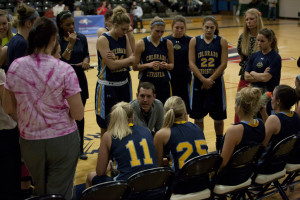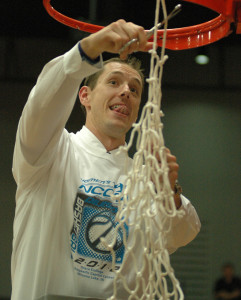With his team trailing 9-0 at the beginning of the 2012 National Christian College Athletic Association championship game, Tim Hays called a much-needed timeout.
The fourth-year Colorado Christian women’s coach looked at his team captain Kelsie Hert, a senior who had been with Hays from the beginning, and asked her a question: “You’ve seen what God has done over the last four years. Do you really think this is going to rattle us?”

Hays instructing his CCU team during a timeout.
Without blinking she responded, “Not a chance, Coach.”
Hays’ players were no strangers to overcoming obstacles —three freshmen had all dealt with serious personal issues throughout that season alone. So, they scampered back onto the court with a renewed sense of freedom and a commitment to have fun and represent Christ.
And then a scene straight out of a movie unfolded.
“It was the most amazing thing I have ever seen,” Hays says. “We went on a 29-6 run to end the half and led Cedarville University by as many as 22 points in the second half.”
Colorado Christian won that game 62-44 to claim an improbable NCCAA championship. It had taken Hays just four years to turn a program with one winning record in the previous 19 seasons into national champions.
“It’s unbelievable what God has done with the little group of girls who started this program,” Hays says.
God's Work In Boise
Hays’ journey started at Boise State, where he played two years of basketball before finishing his career at Northwest Nazarene University. He married his college sweetheart, Crista, an all-conference hoops star at Boise State, but he struggled to find his professional identity.
Meanwhile, FCA in Idaho was struggling to develop a strong foothold on campuses around the state.
But Hays had a vision for FCA in Idaho. He volunteered for several months and then asked Gene Bleymaier, the Boise State athletic director and chairman of the FCA Board of Directors, to schedule a meeting.
Within the next year, Hays proclaimed, the ministry would have steady funding and campus ministry started in a large percentage of Idaho high schools.
As Hays remembers it, some of the men in the meeting didn't believe it could happen, but he challenged them to believe in God's power and provision for the ministry.
And with the backing of those men, his supportive wife, and contributors along the way, Hays led an effort that paid down the ministry’s deficit and, by the end of that first year, FCA was reaching high school campuses across the state.
“At that point, it was very evident to me that, no matter what God was going to have me do in my life, qualified or unqualified, He was going to use me for His purpose,” Hays says. “That was just the start.”
To The Outback and Back
Hays was on staff with FCA for two years before moving on to pursue coaching opportunities, something he felt God was leading him to do. While searching for openings, he picked up a job working at Starbucks in Meridian, Idaho, where he met a local high school coach and soon struck up a friendship. Hays began studying the coach’s games and independently put together game recaps and summaries for him. Eventually, the coach offered him a job as his assistant coach. After two years, Hays was hired as an assistant coach at Montana State in Bozeman, Mont.
But the situation there didn’t turn out as expected, and, at the height of his frustration, Hays received a somewhat random call from the coach of a women’s professional team in Australia. The Launceston Tornadoes needed to replace an injured player, so Hays immediately thought of his wife and sent the coach film from Crista’s college playing days. She hadn’t played in three years, but, upon reviewing the tape, the coach sent a contract for her to join the team.
The hitch, of course, was that Hays had to finish his contract at Montana State, meaning he’d be apart from Crista for six months. But when he visited her two months into the gig, his candor with a board member led to an improbable opportunity, and he was soon hired to be the team’s head coach. He and Crista consistently received better contracts each year, and in 2008 they were offered the chance to work for one of the top women’s teams in Australia. The contracts offered would set them up financially for life.
“But we had really struggled to find stability in a local church,” Hays says. “Our church at-tendance usually consisted of watching online ministry back in the States. To make matters worse, the new contract strictly forbade me from mentioning my faith within the context of my coaching duties.

Hays with his team during a timeout.
“It was a major dilemma.”
Hays decided that rather than staying, he should search for job openings back in the United States. A close friend told him about Colorado Christian University, so he sent in his résumé. About a month later, he received a call at 3 in the morning from Darren Richie, the school’s athletic director. The women’s head coach had taken a job at Brown University, Richie said, and he had two excellent female candidates in mind, but he wanted to give Hays a "courtesy" interview.
After a three-hour conversation, it was clear to both men that God was up to something. Three additional early-morning phone interviews later, Hays was hired. He and Crista walked away from a life-changing financial situation in exchange for an opportunity that offered the exact opposite—coaching a poorly funded program with just seven players.
“At that point, I was reminded of my time with FCA,” he says. “I saw God take that from noth-ing to a vibrant ministry. I was inadequate back in Boise, and I was inadequate when I was offered the job to rebuild this program from scratch. It was literally going to have to be a God thing if it was going to be built well.”
Spiritual Hoop Dreams
Hays landed in Denver just two days before his players arrived for school. At the first team meeting, he recognized another problem—five of his players were 5-foot-5 or shorter. But, after showing them a video based on the Chris Tomlin song, “How Great Is Our God,” Hays went back to the mode he displayed at the FCA board meeting years earlier.
This downtrodden program, he proclaimed, would win a national championship within five years.
Hays then asked the players for their dreams. Jodie Krall, a sophomore on the team, candidly said she only hoped for a .500 record, but Hays was looking for something bigger—something that only God could make happen. Jodie stood up again and amended her first goal.
“I want to go to the NCAA tournament,” she said. “And I want to know that at least one person has accepted Christ or come to a better knowledge of who Jesus is every time we play.”
The team was inspired and adopted those goals as its own prior to its first regular season game at top-ranked Alaska-Anchorage, which hadn’t lost a home game in three years. Miracu-lously, Hays’ seven undersized ladies led almost the entire game. When his best free-throw shooter missed six straight within the final 30 seconds, Anchorage pulled out a 55-54 victory.
Hays was sick to his stomach. He began thinking selfish thoughts and questioned God. The teams prayed together on the court and had walked back to the locker room when Hays real-ized he’d left his clipboard on the bench. He walked back onto the court, and the entire crowd was still standing there. They were all quiet and staring at him. As he grabbed his clipboard, an older lady dressed in green and yellow ran towards him.
“That was a crazy game,” she told the coach. “I haven’t missed a game for 20 years. I have never seen a team come on to our home floor and punch us in the mouth like that. Aren’t you guys angry right now?”
Hays paused briefly and then calmly responded.
“Not a chance,” he said. “I am so proud of my girls and the way they just gave it all for the Lord. I think we’re going to celebrate.”
The woman admitted to Hays that she had never believed there was a God, but now, she wanted to know about God. Right there, on the middle of the floor, Hays shared the Gospel with her and told her how she could enter into a relationship with Christ.
By the time Hays got back to the locker room, he was reminded of the team's goals. One of those had been accomplished.
“You just won,” he told his girls through tear-filled eyes.
Professing His Name
Four years later, Colorado Christian found itself in a similar position, only this time it was during the NCCAA tournament. The day before CCU was scheduled to play Cedarville for the national title, Hays took the team out into the community in search of opportunities to serve others and share the Gospel.
One group of players ran into a very distraught lady. She invited them to her home so they could talk. The stranger had graduated from a Christian university with a theology degree and used to love God, but after enduring an abusive marriage and subsequent divorce, she no longer believed in God because He would never let that happen to someone.
“When life throws you a curve ball,” she said to Bre McBeth, the team captain, “you’ll find out that God is not real.”
“Ma’am,” McBeth responded, “life has thrown me a curve ball. My dad died in his sleep not long ago. My family almost fell completely apart. My sister just got diagnosed with an untreata-ble heart disease that might kill her, and she’s 18. I don’t know what’s going to happen, and I’m angry with God because I can’t believe these things happen. But I know He’s real. Even though I’m angry, He’s real.”
That group of girls ended up leading the woman back to Christ.

Hays cuts down the nets after winning the 2012 NCCAA Championship.
“It brings everything full circle and into perspective,” Hays says. “We were about to play for a national championship, but nothing could beat that. God was using athletics in a way that professed His name.”
After the incredible tournament run, Hays was named NCCAA Division I National Coach of the Year. The accolades opened the door for him to travel the country and speak at Christian high schools and FCA groups. More importantly, he has consistently seen the team's dream come true.
“God has used our story in a way that’s allowed me to invite people to know Christ,” Hays says. “It’s because our girls did what they did on the court and used sports as a platform. We get to tell these stories, and people keep coming to Christ.”
Originally Published: March 2013
Photos courtesy of John Adam, Ryan Masterson and CCU Athletics